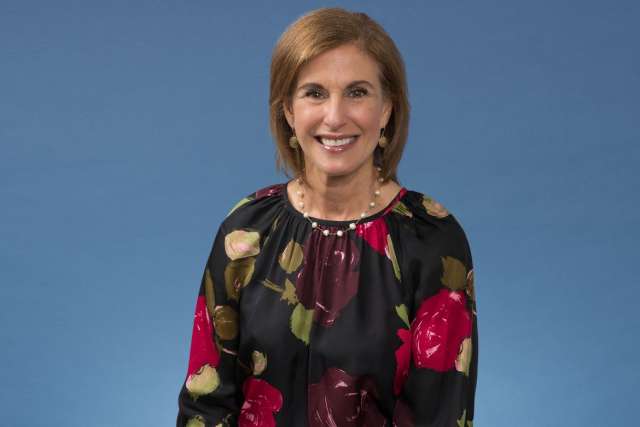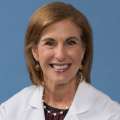A $5 million gift to UCLA from Nancy and Howard Marks will endow a faculty chair held by the Vice Chair of Women’s Health Research in the department of obstetrics and gynecology at the The gift will provide resources to help ensure that women’s health research efforts at UCLA Health are led by an eminent physician-scientist for many years to come.
The inaugural holder of the Nancy Marks Endowed Chair in Women’s Health Research is Dr. Beth Karlan, a UCLA professor of obstetrics and gynecology and the department’s vice chair of women’s health research.
“Beth Karlan is the ideal physician-researcher to lead new investigations and mentor others for this vital work,” Nancy Marks said. “Beth continues to treat and prevent cancer in families that may have otherwise been ravaged by genetic cancers. Her compassion and creativity make her uniquely suited for this work.”
Nancy Marks has long been an advocate for preventive medicine, especially while serving on the boards of New York-Presbyterian Hospital and its integrative health center. She is a trustee of the Lynne Cohen Foundation, which provides support and care for women with ovarian cancer and breast cancer, and a member of the board of the Melanoma Research Alliance, among other nonprofits. Howard Marks is an acclaimed investor and the cofounder of Oaktree Capital Management, one of the largest investors in distressed assets.
The need for increasing emphasis on women’s health is clear. As recently as the second half of the 20th century, women were largely overlooked in medical research. Scientists generally considered women to be smaller versions of men, and failed to take into account gender differences in biology and disease — even the study of biology in animals utilized all-male cohorts. As late as the 1970s, few women worked in medical research, and the study of gender-based conditions was a low priority.
The early 1990s saw major steps forward with the passage of the National Institutes of Health Revitalization Act of 1993, which set requirements for including women and minorities as subjects in clinical research, and the NIH’s formalization of a rule in 1994 that the government would not fund clinical studies that did not include these groups. But since then, researchers have had to make up a lot of ground to reach parity in terms of the inclusion of women in medical research and drug development.
Karlan is recognized as one of the nation’s foremost authorities on ovarian cancer. She earned her medical degree at Harvard Medical School before completing her residency at Yale New Haven Hospital. Karlan then completed a fellowship in gynecologic oncology at UCLA before joining the faculty; shortly thereafter, she also joined Cedars-Sinai Medical Center, where she served as director of gynecologic oncology. Karlan has earned international accolades for her efforts to improve the detection, treatment and prevention of ovarian cancer and other gynecologic malignancies.
“Dr. Karlan is a pioneer in the use of cancer genetics to inform treatment decisions, improve survival and quality of life, and empower families with elevated genetic risk factors to take informed action,” said Dr. Steven Dubinett, interim dean of the Geffen School of Medicine. “She led the creation of a tumor biorepository for gynecologic cancers, which continues to prove critical to advancing our understanding of hereditary cancers.”
Annual payouts from the endowment created by the Markses will enable Karlan to allocate funds to support promising research studies and the investigators leading them, mentor OB-GYN fellows and continue her own cancer research. In her current investigations, Karlan is working on making cascade genetic testing for families with elevated cancer risk the standard of care, as well as other avenues to prevent and treat cancer.
“I cannot thank Nancy and Howard enough for their generosity and vision,” Karlan said. “Nancy has long been a champion of the work we do, providing cutting-edge and compassionate care to women with cancer while striving to find new ways to treat and prevent the disease. I am humbled to hold the chair that carries her name as I seek to foster new talent and expand the reach of research that will improve the well-being of more and more women — and men — everywhere.”
As a further tribute to Karlan, when she is no longer the chair holder, the endowed chair will be renamed in her honor.




